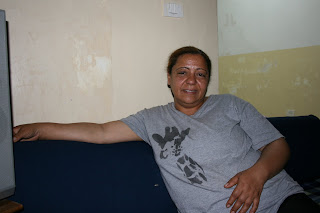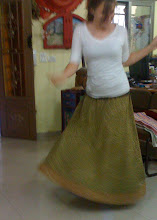 At what point do we say enough is enough? What standard of living is considered decent? What line do we draw and say, that is the best we can do?
At what point do we say enough is enough? What standard of living is considered decent? What line do we draw and say, that is the best we can do?Sure, they walk the streets to be spit on, see their homes set on fire, are called to the front of the classroom to be called 'nawar,' or dirty Gypsy, in front of all the students. Yeah, so they have the highest drop-out rate with less than 50% making it past middle school, the children are begging on the streets, most of the men are unemployed. They have clothes on their back. While food is carefully budgeted, they don't starve. They may crowd 8-10 in a room, but they still have a roof over their head. There are so many that don't even have this. Why don't we just call it a day, and say, insha'allah, things will change?
While many of West Jerusalem's services were extended to the Old City and East Jerusalem after 1967, including mandatory education, water supply, etc., today, when focusing on the Jerusalem population, the political, social, economic treatment is undeniably 'separate and unequal,' as described by Amir Cheshin, former advisor on Arab Affairs to Mayor Teddy Kolleck from 1984 to 1993. One doesn't need the words of an inside policy-maker to convince you of this- when I visit my friend in Rehavia, an Israeli neighborhood, I take the bus through East Jerusalem, walk by the Old City and then continue into West Jerusalem. One only needs eyes to see the drastic disparity in standard of living, public services, and infrastructure investment. Why this is the case is not the point here, so I want to leave the argument of Arab rejection of these services (because it would mean Israeli authority) versus the municipality's choice to only inject the minimum much needed money in East Jerusalem aside. Either way, it is obvious that disparity in basic governmental services exists. This leads to poorer schools, higher drop-out rates, limited infrastructure development, economic stagnation, and overall the exacerbation of the needs of the Palestinian population. A 'united' Jerusalem, but one with two very different appearances. One word that has been latched onto, as demonstrated in Roger Cohen's recent op-ed when he quoted Adam Bittlingmayer of Google, and in Obama's speech, is humiliation.

I traveled to Tel Aviv to meet Omri Kabiri, an Israeli lawyer who represents the Domari community pro-bono. His office is located in the Moshe Aviv Tower, the tallest in Israel, and the 8th tallest in the Middle East. In many ways, it is a testament to Israel's magnificent growth, matching its thrust onto the world stage politically with equal economic power. Amid many other towering skyscrapers, the modern cafes and trendy youth were a stark contrast to my typical surroundings of kaik bread and vegetable and fruit stands of Shu'fat and the Old City. And in this tower of modernity, in this wonderful man's office, I heard him use the phrase that was truly the summation of my observations and experiences over the past two months- the Doms were the Arabs' Arabs. As I have mentioned before, not only do they endure the limitations and -here comes the term- humiliations of being grouped with the Palestinians, but are oppressed by the oppressed. Their identification papers say Arab, the census says Arab, and the Israelis see Arab. But the Arabs see, call, taunt, 'nawar.' A 15 year old boy had his throat slit because the killer had been told that the a Gypsy's life had no value. When a Gypsy had many items close to her stolen, it became a laughing joke, the Gypsy got 'gipped.' The services that are offered through the municipality by Arab social workers hardly ever makes it to the Gypsies, and when it does, they work through the ancient mukhtar system (the individual of the community leader as appointed during British rule), rather than the most effective channels. They are considered unmarriable, and even when true love happens, too often the marriage is considered impossible because the Arab family would reject a Gypsy wife for their son. Their homes have been attacked, trees set on fire, pelted with stones.
Humiliation. Compounded by both sides. So much, that most of the youngest generation refuses to be identified as Gypsy. Their dance, colors, and nomadic lifestyle has slowly faded away. The language of old is just that- it is only with concerted effort to hold classes that the older generation can teach the younger the words of their spoken-only language.
Jerusalem, transformed in the 20th century alone from a sleepy town with religious significance, to center of Zionism, to a battleground in 1948 and a tenuous, divided frontier until 1967, a united city in name only until present day, disputed, claimed, idealized, revitalized, expanded, and continually in the spotlight, has housed this community for 400 years. They hid is St. Anne's church during the 1967 war, located right next to Lion's Gate, where the victorious Israelis entered the Old City for the first time since 1948. They remained in their homes, hiding out through both intifadas. They hold no ill-will, and they smile at the name of Rabin, while at the same time, find it almost impossible to travel freely to other parts of the world because Israel does not differentiate them as an ethnic minority or recognize their cultural heritage. While many left for Jordan long ago, those who remain are one with their home in the Old City- this small parcel of land, the source of so much hatred, violence, religious fervor, and focus- and therefore, their fate will forever be tied to Jerusalem, and everything that entails. After years of conservative rule in the mayorship of Jerusalem, the current mayor won because the orthodox majority squabbled among themselves to the point of division and election defeat. After Mayor Barkat, if the Orthodox get their act together, any hope for the municipality or government playing a constructive role in the development of the Domari community will be dashed. And this is something they drastically need. While living here longer than the majority, they are still forever at the will of the political, religious, and social divisions and dynamics of this unique city.
So, as we look into the future of this city, forever in question and examined, the question begs to be asked- what about the Domari? What is the best that can be done here, in this city, in this situation?
Hell if I know. I'm about at my wits end trying to make these interviews happen. The number of excuses and delays has hit the point of hilarity. Two weeks. oi.






Taylor -
ReplyDeleteOur mutual friend Linda sent me your blog because I just got back from Jerusalem (I'm one of them Mormons that had to travel in ridiculously large groups). I am so grateful for your article and work with the Domari: I did some work in the community while I was there and it's a truly sad situation.
A group of us who went are working hard on a website to promote greater understanding of the Palestinian-Israeli Conflict from a less hard-news and more human interest point of view. If you would like us to publish any pictures, comments, or even articles that you would like to contribute (we have a pretty good readership and are reaching out more all the time), we would love to do that. We would also love to hyperlink this article on our homepage.
Feel free to email us at progress4ip@gmail.com.
Sincerely,
Tamarra Kemsley
I feel like I think like you write.
ReplyDeleteand one of my biggest wishes is that i could put words so eloquently down on paper...
I think I'd like to examine what sub-cultures this phenomenon occurs to in the US. I am sure there is some, but either way generalizations must be made....
yea see, i suck at sounding profound...
you are just making me uber jealous with this whole experience tho.... :P
I too cannot express in words the emotions you bring to me with your writing. I know the tears in my eyes tell me that my heart breaks for this group of human beings I know so little about, but through your experiences I am learning. Now the challenge to you is to education us as to what we can do to stop the cycle that is so deeply ingrained in history?
ReplyDeleteTaylor, that first photo is so beautiful. I'm excited that you're joining us soon but I hope that you leave feeling content with what you've accomplished thus far.
ReplyDelete